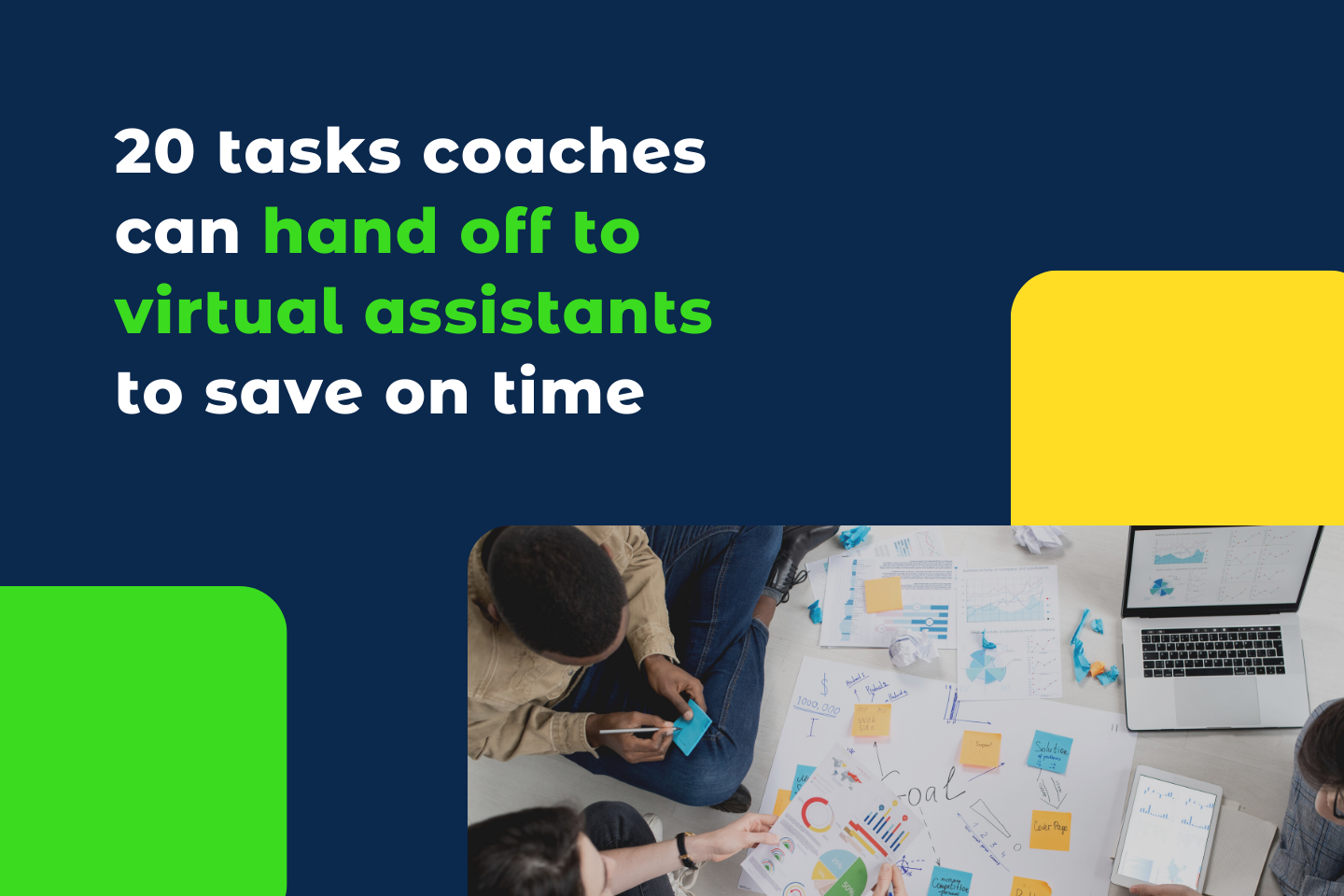Time is a coach’s most valuable asset. Juggling client sessions, planning strategies, and managing administrative tasks can be overwhelming and leave little room for creativity and growth. That’s where virtual assistants (VAs) come in.
By partnering with a VA, coaches can offload a wide range of time-consuming tasks and free up their schedules to focus on what truly matters – guiding and empowering their clients.
In this blog post, we will explore the common tasks coaches can confidently hand off to virtual assistants to save time, streamline their workflow, and elevate their coaching practice to new heights.
Virtual Assistant for Coaches
Coaches are experts in their field, dedicated to helping others achieve their goals, overcome obstacles, and unlock their full potential. However, the demands of running a coaching business extend far beyond coaching sessions. From managing schedules and appointments to marketing, content creation, and client support, the administrative and operational tasks can quickly consume a coach’s time and energy. This is where virtual assistants step in as invaluable partners.
VAs are skilled professionals who provide remote administrative support to business owners, taking on a wide variety of tasks that don’t necessarily require the coach’s personal touch or expertise. By delegating these everyday tasks to a remote administrative assistant, coaches can reclaim their time, reduce stress, and focus on what truly matters – their clients and their own professional growth.
Leveraging Virtual Assistants
Because VAs are primarily independent contractors rather than employees, they are subject to different laws and regulations. Understanding this differential is crucial because it affects things such as rates and perks. You might anticipate lower prices when hiring on a freelance basis, than when hiring a full-time employee because their hourly rates frequently do not include pension payments, non-productive bonuses, and similar perks. In fact, statistics show that by utilizing virtual assistants, businesses can experience cost savings of up to 78% in their operating expenses.
Factors to Consider When Deciding Which Tasks to Delegate to VAs
Deciding which tasks to delegate to virtual assistants is a crucial step in streamlining your coaching business and maximizing your productivity. To make informed decisions about task delegation, it’s important to consider several key factors:
Core Competencies
Start by identifying your core competencies as a coach. These are the tasks that require your expertise and personal touch. By focusing on these core competencies, you can optimize your impact and value to your clients. Anything outside of your core competencies can be considered for delegation to a virtual assistant coach.
Skill Compatibility
Assess your own skill set and identify tasks that align better with your strengths and expertise. For tasks that fall outside your comfort zone or require specialized skills, it may be more efficient to relegate them to a virtual assistance professional who possesses the necessary skills and experience.
Cost-Effectiveness
Consider the cost-benefit ratio of delegating certain tasks. Compare the value of your time spent on a particular task versus the cost of outsourcing it to a virtual assistant. If the task is relatively low-value or can be completed more efficiently by a VA at a lower cost, it may be a wise decision to delegate it.
Time-Intensive Tasks
Take note of tasks that consume a significant amount of your time. These may include administrative duties, email management, scheduling, data entry, research, or social media management. Delegating these time-intensive tasks to a virtual assistant services provider can free up your valuable time, allowing you to concentrate on coaching and business development.
Training and Communication
Evaluate the feasibility of training a VA to handle specific tasks. Determine if the task requires minimal training or if you have the resources and willingness to provide comprehensive guidance. Clear communication and regular feedback are crucial for effective task delegation.
Long-Term Impact
Consider the long-term impact of delegating certain tasks. While some tasks may require immediate attention, others can be strategically handed over to promote long-term growth and scalability. Assess the potential for delegation to enhance your overall business operations and allow for future expansion.
20 Tasks Coaches Can Hand Off to a Virtual Assistant
Let’s discover how coaches can streamline their workdays with the help of a VA.
Organizational and Admin Tasks
Virtual assistants can be a valuable asset in helping coaches offload administrative services and organizational tasks, allowing them to focus on their core coaching responsibilities. Let’s take a look at some crucial tasks VAs can handle:
1. Email and Calendar Management
VAs can efficiently handle email correspondence, filtering out spam, responding to routine inquiries, and organizing the inbox. They can also manage the calendar, ensuring the coach’s schedule stays organized and optimized.
2. Travel and Accommodation Arrangements
If you frequently travel for coaching sessions, workshops, or conferences, a VA can take care of travel logistics. They can research and book flights, accommodation, transportation, and even prepare itineraries, saving you time and eliminating the stress of travel planning.
3. Document Creation and Formatting
VAs can create and format documents such as coaching agreements, session summaries, or client assessments. They can ensure consistency in branding and formatting, saving you time and presenting a professional image to coaching clients.
4. Research and Data Entry
VAs can conduct research on various topics related to the coaching niche, gathering valuable information, statistics, or industry trends. They can also assist with data entry, organizing research findings, or inputting client information into the coach’s systems.
5. Financial and Expense Management
VAs can assist with basic financial tasks, such as invoicing clients, tracking expenses, or reconciling accounts. They can work closely with the accountant or bookkeeper to ensure smooth financial management.
Content Management and Marketing Support
Content creation and marketing are essential aspects of growing a coaching business, but they can be time-consuming and require a specific skill set. Here’s how virtual assistants can help coaches handle these tasks and maintain a consistent and effective online presence:
6. Content Strategy and Planning
The VA can develop a content strategy that aligns with the coaching goals and target audience. They can outline topics and formats for content, and collaborate with you to create a content calendar that outlines publishing dates and platforms.
7. Content Creation
The virtual assistant can help write, edit, and proofread content to ensure consistency, quality, and adherence to the coach’s brand voice and messaging.
8. Social Media Management
VAs can handle social media platforms where you have a presence. They can create and schedule posts, engage with the audience, respond to comments and messages, and track social media analytics. They can also research and incorporate relevant hashtags and trends to maximize visibility and engagement.
9. Email Marketing
Virtual assistants can develop email marketing campaigns that nurture the coach’s client base and attract potential clients. They can assist with creating email templates, writing compelling copy, segmenting the email list, and monitoring campaign performance through analytics.
10. Graphic Design and Visual Content
If visual content is required for the website, social media, or marketing materials, VAs with graphic design skills can create graphics, banners, infographics, or other visual assets to enhance the coach’s brand presence.
11. Search Engine Optimization and Keyword Research
VAs can conduct keyword research to optimize the website and content for search engines. They can help identify relevant keywords and phrases, incorporate them into the content, and optimize meta tags and descriptions to improve the business’s online visibility.
12. Analytics and Reporting
VAs can monitor and analyze data from the website, social media platforms, and email campaigns. They can provide regular reports on key metrics, such as website traffic, social media engagement, or email open rates, helping the coach assess the effectiveness of their content and marketing efforts.
Research and Analysis Support
Virtual assistants can enable coaches to offload research tasks and focus on their core coaching responsibilities. Here are some key ways in which they can help:
13. Market Research
VAs can collect data on industry trends, competitors, target audience preferences, and customer behavior. This information can aid coaches in refining their strategies and identifying potential opportunities.
14. Data Analysis
Virtual assistants with data analysis skills can assist coaches in analyzing collected data. They can clean and organize data sets, apply statistical analysis, and generate meaningful insights and visualizations. Moreover, VAs can help coaches understand patterns, trends, and correlations within the data.
15. Trend Monitoring
VAs can stay updated on industry trends, emerging technologies, and best practices. They can monitor relevant publications, blogs, and social media platforms, providing coaches with timely insights that can influence their coaching approach and business decisions.
Customer Service Support and Relationship Management
A good VA can help coaches manage customers, allowing them to focus on their core coaching responsibilities. Here’s how:
16. Chat and Email Inbox Management
VAs can handle customer inquiries and support requests through email or chat platforms. They can respond to routine inquiries, provide information about your coaching services, or assist with basic troubleshooting. VAs can also manage and organize your inbox or chat logs, ensuring efficient and timely responses.
17. Issue Resolution
VAs experienced in customer management can also address common customer issues and provide responses to frequently asked questions. They might be crucial in resolving issues and preventing them from escalating.
18. Client Onboarding and Follow-up
VAs can assist in client onboarding by sending welcome packages, collecting necessary information or forms, and providing basic orientation to your coaching process. They can also follow up with clients to gather feedback, schedule follow-up sessions, or send client satisfaction surveys.
19. CRM and Database Management
VAs can help manage your customer relationship management (CRM) system or client database. They can update client information, track client interactions, and ensure accurate and up-to-date records. VAs can also assist in segmenting your client base for targeted communication or marketing initiatives.
20. Appointment Scheduling and Reminders
A virtual assistant might be in charge of scheduling coaching sessions, workshops, or consultations. They can use AI-powered tools to coordinate appointments, send reminders to clients, and handle rescheduling or cancellations, ensuring smooth and organized scheduling processes.
The Bottom Line
Delegating back-office tasks to a virtual assistant is a powerful strategy for coaches to reclaim their time, increase productivity, and focus on what they do best – coaching.
By offloading administrative, organizational, content creation, research, customer support, and other tasks to competent VAs, coaches can free up valuable hours each day. This newfound time allows them to invest more energy in growing their business, deepening client relationships, and honing their coaching skills.
So, take the leap, hand off those time-consuming tasks, and unlock the full potential of your coaching journey with the support of a skilled virtual assistant!

